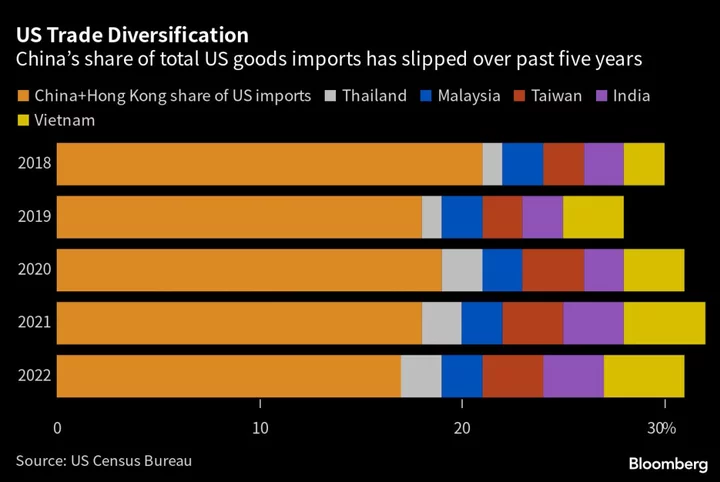US inflation showed more signs of moderating in April, giving the Federal Reserve room to pause interest-rate increases soon.
Policymakers at the Bank of England aren’t ready to call it quits yet after raising interest rates to the highest level since 2008 and signaled more may be needed. Inflation in the UK is still running far above the central bank’s target, especially as food prices refuse to abate.
In Asia, China’s recovery lost steam last month as imports plunged and export growth slowed. The trade data also stirred speculation about whether authorities will take more supportive actions to help the economy.
Here are some of the charts that appeared on Bloomberg this week on the latest developments in the global economy:
US
Key drivers of underlying US price pressures began receding in April, suggesting the final puzzle pieces for a return to more-normal inflation rates are falling into place.
The Fed said that banks reported tighter standards and weaker demand for loans in the first quarter, extending a trend that began before recent stresses in the banking sector emerged. The survey of lending officers showed banks cited a lower risk tolerance, a dimmer economic outlook and worsening industry problems as their reasons for tightening credit.
Public confidence in Jerome Powell’s leadership of the Fed has dropped precipitously, according to a new survey, and is now at or below his predecessors’ as the central bank wages its war against inflation. President Joe Biden has the confidence of 35% of Americans on the economy — the lowest of any president since George W. Bush received 34% during the 2008 financial crisis.
Europe
The BOE, after raising its benchmark lending rate, indicated that further increases may be needed if inflationary pressures persist. Officials led by Governor Andrew Bailey also delivered the biggest upgrade to growth projections since the BOE gained independence in 1997, erasing a recession previously forecast.
Consumer expectations for euro-zone inflation rose “significantly” in March — bolstering the case of European Central Bank officials who say interest-rate increases may need to persist beyond the summer.
German industrial production sank by the most in a year — raising the risk that Europe’s largest economy slipped into a winter recession.
Asia
Chinese imports plunged and export growth slowed in April as the recovery waned, raising concerns about the country’s ability to boost the global economy.
Japanese workers’ real wages continued to fall in March, in a weaker-than-expected result for pay that’s under close scrutiny from both the Bank of Japan and Prime Minister Fumio Kishida. Monthly real cash earnings dropped 2.9% from a year earlier, slipping for a 12th straight month
The Chinese economy’s debt ratio reached a record high in the first quarter, with bank loans to companies surging as the nation reopened from Covid Zero. The macro leverage ratio — or total debt as a percentage of gross domestic product — soared to 279.7%, according to central bank and statistics bureau data compiled by Bloomberg. The 7.7 percentage points increase from the previous quarter was the biggest in three years.
Emerging Markets
Recep Tayyip Erdogan is seeking re-election on May 14 and for the world’s money managers, the election outcome could determine whether Turkey becomes a “buy” again. Investors plowed cash into the country during the boom times of the early Erdogan years. More recently, they’ve been heading for the exit as he and his loyal circle of technocrats defied economic orthodoxy by cutting interest rates while everyone else was raising them to cool inflation.
Chile’s annual inflation eased back to single digits for the first time since March 2022. Over the past two years, Chile’s economy has been hit by a series of inflationary shocks, including billions of dollars in both emergency spending during the pandemic and early pension fund withdrawals, as well as a jump in commodity costs.
World
Companies spooked by pandemic shortages, price spikes and shipping disruptions are reducing reliances on a single factory or country. Meanwhile, governments — especially those in the US and Europe — want to ensure access to key materials like semiconductors and rare-earth minerals in case the world trade splinters into geopolitical blocs.
The BOE was the only major central bank to hike rates this week. Serbia unexpectedly held steady, while Poland, Romania and Peru also left rates unchanged. Georgia cut its main rate.
--With assistance from Onur Ant, Andrew Atkinson, Selva Bahar Baziki (Economist), Bryce Baschuk, Matthew Boesler, Shuqin Ding, Gregory Korte, Lucille Liu, Matthew Malinowski, Jonnelle Marte, Yoshiaki Nohara, Zoe Schneeweiss, Ailing Tan, Alexander Weber, Lucy White and Erica Yokoyama.

